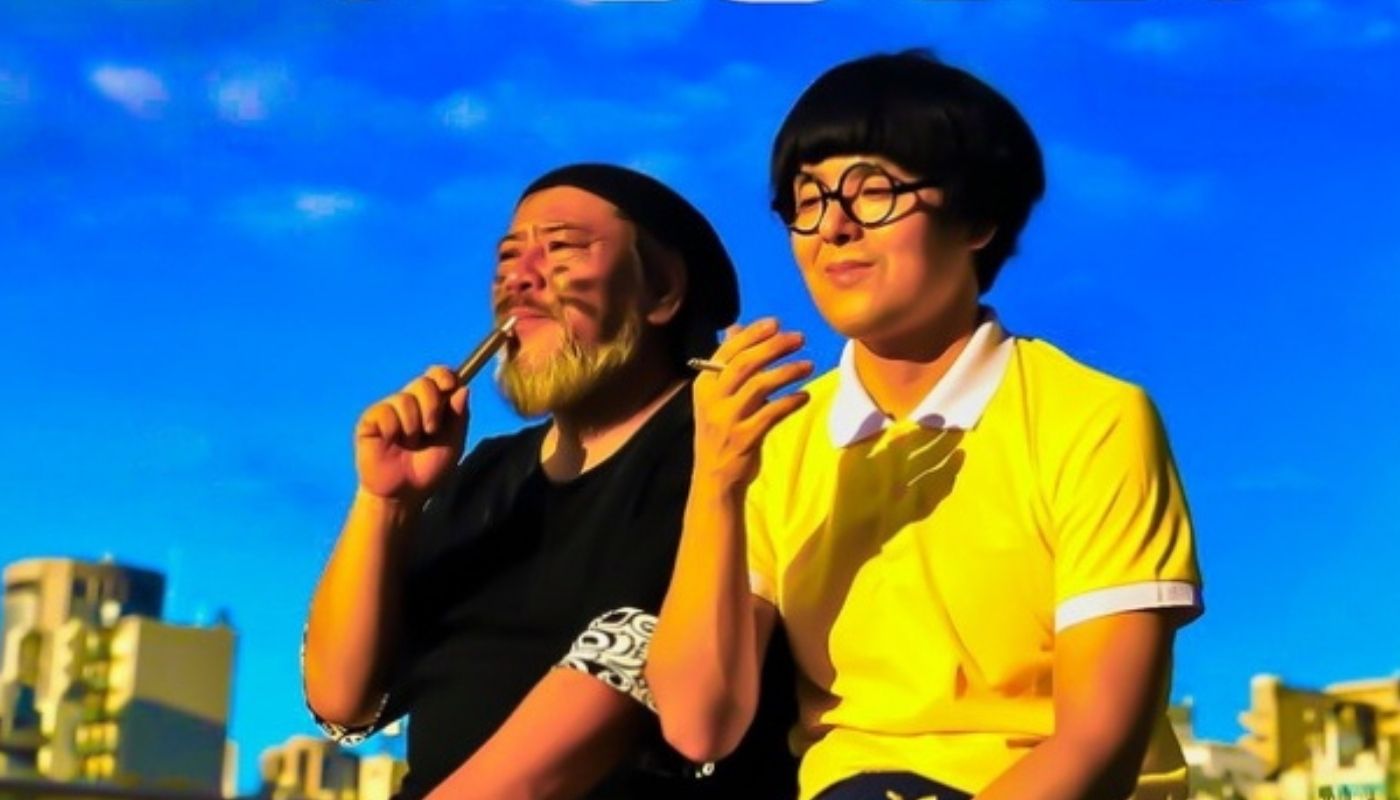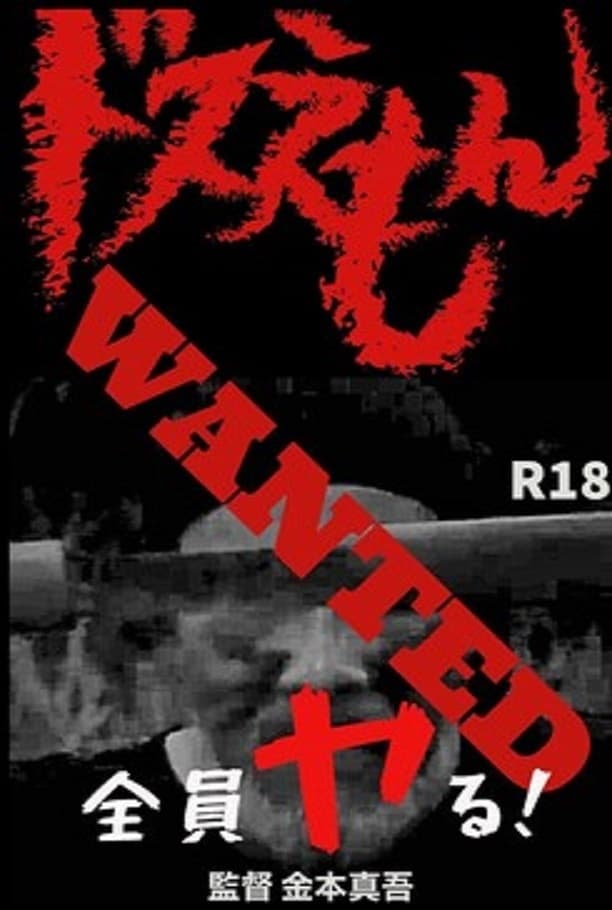
One of the more curious selections to be found on the lineup for the 2021 Japan-Filmfest Hamburg (JFFH). Crowded in among the various alluring arthouse features and more straightforward bombastic exploitation flicks, you’ve got director Shingo Kanemoto’s raunchy little black comedy that is sure to leave viewers amused or storming off in disgust in equal measure. And that is where we probably ought to start with discussing this film. Nominally, it’s a parody of celebrated Japanese cultural icon Doraemon (1969). Yes, the lovable robotic cat who travels back in time to help preteen loser Nobita sort his life out and ensure a better future.
So it should be made clear outright if, as a film viewer, you are easily offended in any way at all then this is probably not the movie for you. Dosuemon is cut from the same cloth as any number of maverick filmmakers and provocateurs willing to push the envelope with no remorse. Fans of American independent powerhouse Troma will find themselves right at home because like the madcap creations of Lloyd Kaufman and his many collaborators, here nothing is sacred and the movie will actively try to push your buttons escalating things and challenging you as if asking “Is this going too far? How about now?”

That paves the way for a lot of discussion on censorship and morality that is better served in its own article. Personally, whether I end up enjoying it or not, I will always champion films like this because I think that creatives need to simply create. I don’t feel it is my place to judge that sort of thing and support can be better served with one’s time and devotion than by arguing whether something is allowed to exist in the first place. Quentin Tarantino famously rebuffed a critic once by suggesting that maybe he wasn’t making his films specifically for them and that’s a mentality that has often stuck with me. Dosuemon may not be for you and if it’s not, that’s perfectly fine. Spend your time celebrating what you do love. For everyone still with me, buckle up.
The devotion to parodying Doraemon is pretty absolute so even the slightest familiarity with the franchise at all will probably color a bit of your reception to the gags at play. Here, we have our own lovable loser Kasuta (Yu Yamazaki) who is still supposed to be a preteen despite being played by an obvious adult. Likewise, all his friends are portrayed the same way as well. The intent to exactly frame Doraemon’s story makes for some comical translations in this parody that they blow right through without apology. He’s got a lot of the same archetypical problems ranging from local bullies and a girl, Syojyoka, played by former AV star Shijimi, that he is hopelessly in love with. There has to be some praise for Shijimi’s performance as well because her character gets put through hell across the film.
Dosuemon still shows up allegedly from the future to rescue Kasuta from a failed life, but instead of the adorable blue robotic cat, we get a gruff-looking older man clad in black. Rikiya Kaido gives a stellar performance in this role and easily carries the movie with his performance. To be certain, the entire concept of this parody hangs on his delivery and in the wrong hands it could have created an awkward train-wreck. Pleasantly, this is not the case at all. He has a demeanor that could easily pass portraying a yakuza boss, but he takes to the comedic moments here so naturally that it is quite impressive. Unlike Doraemon, Dosuemon’s influence on Kasuta is far more insidious.
For the uninitiated, the usual schtick of many Doraemon stories is that in trying to help Nobita with a certain problem, he will somehow make things worse usually due to one of the many gadgets he has brought from the future. Here, Dosuemon follows the same routine except his solutions often either cause terrible outcomes or force Kasuta to take part in some pretty morally questionable acts. And don’t worry, Dosuemon has his own collection of gadgets as well. Instead of an endless supply of futuristic devices Dosuemon sports a range of sex toys and a wooden sheathed tanto plucked straight from any number of yakuza flicks.
Then, of course, there are the condoms as well. In case you were concerned they might miss this sort of trope from children’s shows, mixed in among all the casual misogyny, sexual assault and rape jokes they take the time to do a full-on wink at the camera PSA style reminder to always be sure to use a condom. It’s so wrong and yet presented with such vigor and reckless abandon that it is hard not to laugh. That, if nothing else, is the essence of this type of grim comedy to me. Morbid gallows humor that stares down the cliffside of any taboo and plunges right over the edge with a smile.
Much of the story is broken up into smaller chaptered vignettes the same way a short form manga or anime might be presented. While this is, again, in line with what they’re lampooning it does make the film feel a bit more like an anthology or perhaps, at worst, for some disjoined. There is a narrative that develops across the film but this element is light and really not too important beyond being the setup for their many antics. I personally didn’t mind this, but if you’re waiting and hoping that everything works up into some sort of big picture then prepare yourself for disappointment.

The first segment is easily one of the strongest and sets up perhaps the best running gag of the film. After getting a sense of Kasuta’s life, Dosuemon sets out to fix his first problem: the bullies. The Jyoian family is a whole group ranging from adults to other “kids” Kasuta’s age that extort protection money from people in the neighborhood. With his trusty knife at hand, Dosuemon arrives at their gathering place in the nearby playground. What begins as if it might be some sort of epic confrontation devolves into Dosuemon awkwardly scaling some of the playground equipment to be level with the head of the family and then flips into him stabbing the guy to death seconds later. This is quickly followed by him dispatching all the rest of the family one by one with ease. Each death prompts a moment where the screen freeze frames black and white with large text stating the name of the character and announcing their death while a comical exploitation film style stinger plays.
This gag continues across the movie any time someone dies to the point you can’t help yourself but cry out laughing when it happens. There’s even some clever direction throughout the film that plays around with the joke once the expectation has been set including the music snapping to a stop alongside the blade being sheathed and a drawn out slow death that leaves you wondering if the cut-in is ever going to happen. I can’t be sure how much of that was deliberately planned from the start or perhaps improvised in the editing room, but it is clear that Kanemoto has an eye for this sort of delicate comedic timing.
The quality varies from segment to segment and you’ll be sure to have your own favorites in the end as they cover a lot of ground. At times some feel the lesser like a martial arts segment, which seemed to be much more like it is present to show off camerawork and choreography talent. The only guarantee is that as they go Dosuemon escalates things regarding the level of depravity he drags Kasuta into. From abducting Syojyoka and breaking her into a sex slave, spiking the family dinner with urine, stealing food from the elderly, instigating a fight with a wannabe “Bruce Lee” complete with yellow tracksuit, stealing a blind woman’s cane, assaulting random women in the street, hurling a crying baby to its death, and the list just goes on and on. There’s even a pretty pointed segment where Dosuemon assaults a young couple after leaving a theater because they were mocking the film they had seen; a film with a pretty familiar leading man. Amid all the chaos we also get some pretty comical side elements at play as well. One of the kids in Kasuta’s neighborhood happens to be an alien and they’re presented as a full-on guy-in-rubber-suit; which is hard not to love for fans of old school practical effects. There’s no reason for this and nobody else ever questions his existence either.
Along the way, we start to get hints of who Dosuemon might be. In the martial arts segment, a guy turns up hounding the duo suggesting that Dosuemon used to be his boss. We never learn more because Dosuemon dispatches him slightly out of frame while Kasuta is preoccupied with other things. Over the final few vignettes, we start to learn the full story. In the wake of their mayhem, the police start patrolling the area seeking a wanted man similar to Dosuemon named Gonzo Dosumoto who is famed for killing many and known as an expert in disguise. Initially, Dosuemon realizes it’s time to go and we get a segment that feels like it might be the finale as he tries to pull the whole family film ending. Announcing that Kasuta’s life is in order, Dosuemon declares that his work is done and he has to return to the future. Yet, it’s not the end at all. We are merely cresting the final hill of insanity before the last drop of this roller coaster.
Ultimately, Dosuemon decides to return and things really start to unravel at this point. Once Kasuta learns about Dosumoto and confirms his identity, Dosuemon escalates his spree killing Kasuta, mentally traumatizing his parents before killing them, and taking Syojyoka for himself before getting bored and offing her as well. This struck me as pretty clever for this type of film. To this point you’re carried on the idea that you’re just watching an adult parody of Doraemon and little else. It’s only on reflection that the realization comes that you’ve actually been watching a depraved madman, an unrelenting killer on his continued rampage but that’s been occluded through the creeping haze of the parody’s filter. Or maybe that’s just trying to get too highbrow with this film?
I’ll save the ending for you to seek out for yourself, but take heart that Dosuemon doesn’t get away with all his antics scot-free. You will want to see that final segment because it includes the incredible moment of decapitation that can be seen in the film’s trailer. While a lot of the kills throughout the movie are pretty quick, this one really played up the gore to amusing effect. Regardless of how the story actually ends, they finish the film off with the whole cast assembled breaking continuity for a Bon dance. It’s a fun, charming capstone to this weird wild movie and I think it imparts a lot of the passion and sense of fun that went into the project as a whole.

That passion is probably my real takeaway from Dosuemon. There’s a whole lot more love for filmmaking here than in any number of pictures churned out along the Hollywood assembly line. The film was crowdfunded via Motion-Gallery and the campaign page offers some illuminating commentary on the production. Kanemoto talks about his dream to be a filmmaker and the weight of society suggesting someone give up such ideals to get a job and have a normal life. He goes on to suggest that people who do what they love until they die, even if they don’t sell well or get recognized worldwide, are incredibly awesome. A life devoted to doing what they love. That to not abandon your dreams and make them true is a tribute to everyone who has supported you along the way. I can’t plainly put into words just how strongly I agree with that sentiment.
Dosuemon is what it is: a confrontationally vulgar black comedy with no shame and no brakes. Yet, it is Kanemoto’s film. The cast, crew, those who supported crowdfunding, and all those that helped out along the way: it is their movie. Their passion is fully on display from the first second to the last and that’s worthy of some praise no matter what you think about the film. It’s not perfect, but personally, I had fun and it easily sold me a ticket for whatever Kanemoto decides to do next. Maybe it’s not high art. Maybe it’s not the type of film that will change the world. But maybe not every film has to be that either. Comedy is so subjective that I’m not sure I can confidently guarantee that you’ll find some laughs; though I certainly did. The fact remains that this is the film that only they could make the way it came out. I would challenge anyone eager to cast a critical eye upon Dosuemon to stand up, get out there and make your own movie before coming back to the table on this discussion. Love it or hate it, Dosuemon is truly a champion for the spirit of independent filmmaking.
Dosuemon streamed as part of the 2021 Japan-Filmfest Hamburg (JFFH) lineup.

More Film Festival Coverage:
It feels like there is constant chatter online about the decline of the horror genre. Yet, for every hollow remake and safe studio engineered big-budget vehicle, there is a wealth… Thorns (2023) is an American sci-fi horror, written and directed by Douglas Schulze. Well-versed behind the camera, Douglas is most known as the writer/director of such films as Hellmaster (1992),… There have been many horror films that tackle the theme of trauma in recent years, but this one really pushes things a bit further. Traumatika is a 2024 horror film… Celebrating Japanese cult cinema, the Japan Film Fest Hamburg is gearing up for its 2021 season running from August 18th to September 1st. What has got us so excited for… South Korean cinema has carved out an incredible niche releasing thrillers tinged with a deliciously dark tone. From brutal revenge-fueled classics like Old Boy to soul-destroying crime thrillers often focused… Like all genres, horror owes much of its success to a handful of tropes that can be worked and reworked time and again. Two popular examples are the slasher archetype…Coming Home in the Dark (2021) Film Review – A Night Drive Straight into Hell
Thorns (2023) Film Review – Natural Thorn Killer [FrightFest]
Traumatika (2024) Film Review – Trauma is a Disease [Frightfest]
Japan Film Fest Hamburg 2021 – Embracing The Underground
Midnight (2021) Film Review – A Master Class in Building Tension
Behind the Mask: The Rise of Leslie Vernon (2006) Film Review – Constructing a Slasher
Dustin is a potentially overqualified office worker who has a lifelong love and fascination with Japan and all things Horror. With a bachelor’s in English Literature and a master’s in Library Science, he devotes way too much time to researching and thinking critically about the media he enjoys. When not celebrating trashy horror films, anime, and idol music, he can be found raving about all things genre cinema as a co-host on Genre Exposure: A Film Podcast or indulging a passion for storytelling through tabletop roleplaying games.


![Thorns (2023) Film Review – Natural Thorn Killer [FrightFest]](https://www.grimoireofhorror.com/wp-content/uploads/2023/07/Thorns-cover-photo-365x180.jpg)
![Traumatika (2024) Film Review – Trauma is a Disease [Frightfest]](https://www.grimoireofhorror.com/wp-content/uploads/2024/07/Screenshot-2024-07-29-5.24.09-AM-365x180.png)


